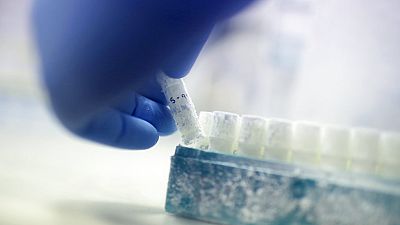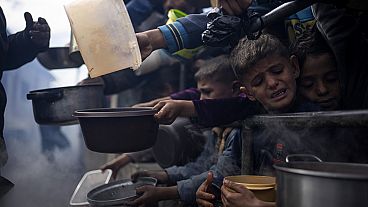Ana Obregón, 68, said only parents who had lost a child have a right to express an opinion on the matter.
A veteran Spanish TV celebrity has revealed her newly adopted daughter was conceived using her dead son's frozen sperm, and is in fact her granddaughter.
Actress and presenter Ana Obregon, 68, made the announcement in the magazine ¡Hola! - reigniting a fierce debate in Spain over the bioethics of surrogacy.
Obregon, herself a biologist, said on Wednesday that doctors had encouraged her son, Aless Lequio García, to preserve samples of sperm before he began treatment for cancer, and that just before he died in 2020 he expressed a desire to have a child. The samples, she said, were stored in New York.
Surrogate pregnancies are banned in Spain, although children from such pregnancies in other countries can be registered. Obregón said she used a surrogate mother in Miami, Florida.
“This girl is not my daughter, but rather my granddaughter,” Obregón told the magazine.
"If that was my son's last will and testament, how could I not do it?" she said, adding that only parents who had lost a child could express an opinion on the matter.
¡Hola! said the baby was born on March 20, having been conceived last June, when her son would have turned 30.
Obregón's extraordinary case quickly grabbed the attention of Spain’s media and politicians, many of whom refer to surrogacy as “womb renting”.
Equality Minister Irene Montero, of the leftist United We Can coalition partner, said surrogate pregnancies were “a form of violence against women”. The coalition’s Socialist party said legislation should be tweaked to prevent Spaniards from seeking surrogacy in other countries.
Where is surrogacy legal in Europe?
Surrogacy is banned across most of the European Union, though some countries including Ireland, Denmark, Belgium and the Netherlands allow it under strict conditions.
In Greece, the practice is permitted for single women with fertility problems and heterosexual couples. However, it is only allowed as an altruistic service, meaning it is illegal to exploit it commercially.
Additionally, only gestational surrogacy is allowed, meaning the person who carries the pregnancy should not have a genetic relation to the baby; the donor should come from a different person, such as the baby’s future parents.
In 2021, Portugal’s parliament passed a law allowing surrogacy in some cases, but the legal details surrounding the practice have not yet been published.
Outside the European Union, other countries permit surrogacy with various restrictions.
Russia banned surrogacy for foreigners in December 2022. The practice is only allowed for married Russian citizens or single Russian women unable to bear children for medical reasons. A surrogate mother must be over 20 years old, have already had a child of her own, and may not share a genetic link with the baby. The gestational mother must also undergo a physical and psychological examination.
Similar limitations apply to Ukraine and Georgia. Ukraine was in fact one of the most affordable and hassle-free surrogacy destinations for Europeans before the industry was upended by Russia’s invasion.
In the UK, only altruistic surrogacy is allowed, both for heterosexual and homosexual couples.
Some of the legal requirements include that, after the birth, the “intended parents” have six months to submit their application, otherwise only the surrogate mother would be considered the baby’s legal parent.
Another special condition is that at least one of the two partners seeking surrogacy in the UK must live in the island nation, the Channel Islands or the Isle of Man. Therefore, the UK is rarely a destination chosen by foreigners looking for surrogate mothers.
The United Nations says surrogacy is “a growing industry driven by demand,” and “an area of concern for the rights and protection of the child”.



